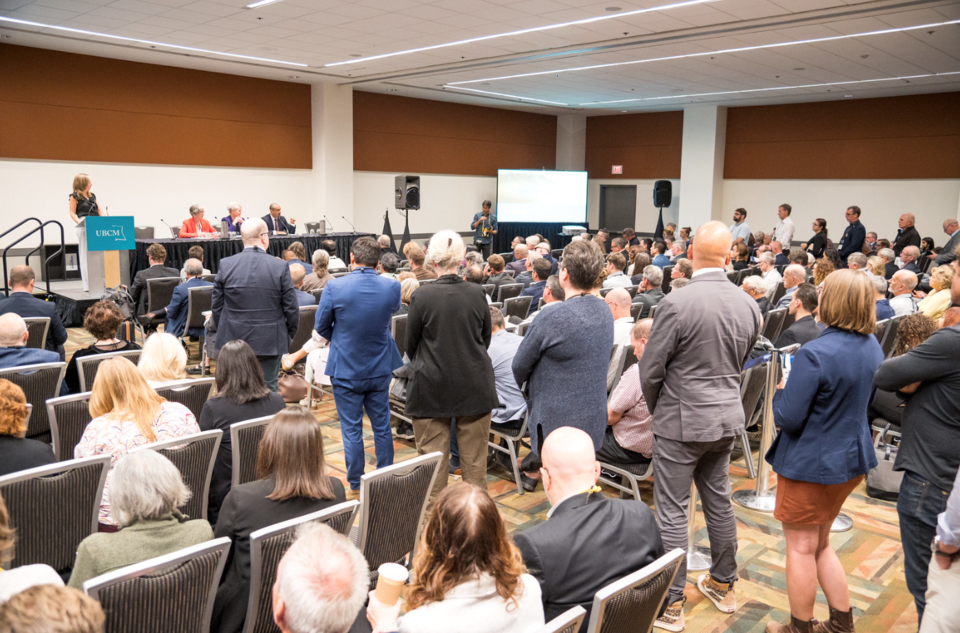B.C. Housing Minister Ravi Kahlon remained tight-lipped regarding details of upcoming housing legislation while attending the Union of B.C. Municipalities (UBCM) Wednesday.
When asked earlier if he could give any hints as to what’s included in the fall 2023 legislation, Kahlon said "it’s coming and it's going to be important."
Housing legislation was not the only thing hinted at by government leaders.
Finance Minister Katrine Conroy made a mention of introducing a flipping tax in spring 2024. Premier David Eby promised this tax in April 2023 as part of the multibillion-dollar Homes for People plan, which aims to build more homes as quickly as possible.
Ministry of Finance spokeswoman Lisa Leslie could not confirm the exact timing of when the flipping tax would be introduced. She said in an email work on “elements of a new flipping tax is well underway and the premier has indicated it is coming soon.”
B.C. Mental Health and Addictions Minister Jennifer Whiteside was also in attendance at the UBCM, where she joined a housing panel with Kahlon and Conroy.
The panel drew about 200 people – mostly delegates – and allowed municipal leaders to ask the trio questions related to housing. Topics such as tiny homes, infrastructure to support housing, the need for skilled trades, public safety and the impacts of short-term rentals were among the issues raised by delegates.
“When you find yourself in a deep hole, what’s the first thing you do? Stop digging,” said Ian Morrison, an electoral area representative with the Cowichan Valley Regional District, who kicked off the question session.
Morrison focused on the declining number of affordable rental housing units and what he described as “the proliferation of short-term rental business.”
Kahlon agreed that there many challenges with short-term rentals and pointed to a outlining the impacts of businesses like Airbnb Inc. have on the housing market.
The report showed rents increased up to 16.6 per cent across B.C. last year because of the resurgence of short-term rentals. The study, prepared by the Urban Politics and Governance research group at McGill’s School of Urban Planning, found that the addition of one short-term rental per 100 rental units in a neighbourhood contributes to an average rise in rent of $49 for that area.
Coun. Amit Gaur from the City of Parksville raised the issue of drought and the carrying capacity of municipalities.
Conroy said the province’s Growing Communities Fund would address drought issues and provide communities with the resources to build more infrastructure capacity.
Kahlon said he hoped the federal government would match the province’s contribution to housing. If Ottawa was unable to do, the housing minister said he wants the feds to at least match the province in infrastructure funding because “investing in infrastructure equals more housing.”
Misty vanPopta, a councillor with the Township of Langley, also raised the question of how to balance the increase in housing with infrastructure.
Whiteside said that there is no question that the township is one of the fastest growing municipalities in the province. She referenced additions to Langley Memorial Hospital and new schools in the township such as the new elementary school in the Willoughby area of Langley.
Coun. Danika Hammond of New Denver, a small community located in the West Kootenay region, described how housing is seasonal in her area and that many homes are going unused for portions of the year.
“We have housing in rural B.C., it’s just being inadequately used,” Hammond said.
Delegates in the room responded to comment with applause.
Conroy followed up by saying B.C.’s speculation and vacancy tax has been hugely successful.
“We've added thousands of more housing into the province because of it,” Conroy said. “So if you're interested in it for your community, come and talk to us.”
North Cowichan Mayor Rob Douglas highlighted the need for housing legislation to meet the needs of not only higher density communities, but rural ones as well.
He expressed concerns as to whether the addition of multiple units on a property, part of the Homes for People action plan, would impact the urban containment boundary.
Urban containment boundaries are used to define areas earmarked for development versus rural or agricultural land.
Kahlon said that urban sprawl was kept in mind when planning the legislation, which he says will be coming this fall.






